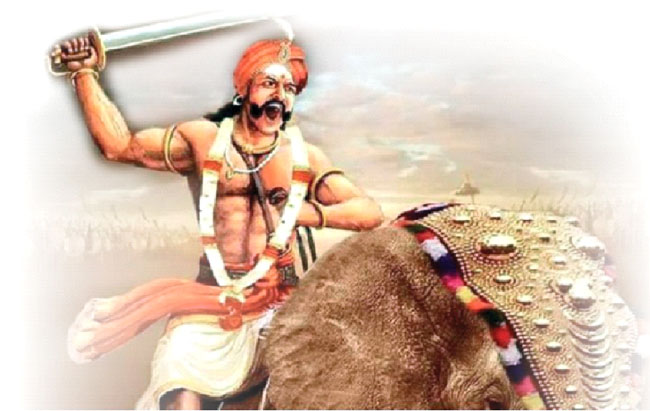Long before Mangal Pandey started the 1857 Revolution, there was another Hindu rebel. Puli Thevar was his name. Puli, which means tiger in Tamil, was blessed with unrivalled combat skills and political understanding
Puli Thevar or Pooli Devar was a Hindu Marava chieftain, who was also known as poligar in English or Palayakkarar in local language. He was a devotee of Bhagvan Shiv and ruled over a region known as Nelkatumseval or Avudayapuram, which is now part of the Tamil Nadu taluk of Sankarankoil. He was a righteous yet rebellious ruler who walked the road of Dharma.
Prior to Mangal Pandey’s Revolution of 1857, Puli Thevar had the distinction of being the first Hindu native local ruler in the entire Indian subcontinent to rise against the oppressive British East India Company. The British company’s land grab continued apace, and they had now reached the Southern tip of the Indian peninsula. The generosity of the Nawab of Arcot was much appreciated. However, Puli Thevar refused to pay the Nawab the customary rice tribute, and the area became known as Nelkatumseval, or “place that does not pay rice tribute.”
During the 16th-18th Centuries, the feudal title Palayakkarar was given to a class of territory administrators and military administrators or agents chosen by the Nayaka kings of South India. They grabbed a quarter of the revenue and put the remainder in the rulers’ coffers. They originally revolted against the British after the Madurai Nayak kingdom fell apart because they were forced to pay kisti land tax to them. The question on their minds was that they and their forebears had been masters of their land for ages, and the British had not only taken control of their motherland but also used intimidation and threats to force them to pay taxes. The British executed a large number of rebellious Palayakkarar. These people originated in the present-day State of Andhra Pradesh.
Puli Thevar had a strained relationship with Mohammed Ali, the Nawab of Arcot. He was a loyal ally of the British, who took control of Madurai and the Southern sections of the State in 1736 after the Nayaks lost their influence. His most notable achievements were his battles with Marudhanayagam, who eventually rebelled against the British. He was a warrior in the Arcot Army and then Commandant of the British East India Company troops. Both utilised him to put down a confederacy of 77 Palayakkarar in Tamil Nadu’s South. All of this occurred in the late 1750s and early 1760s, long before Kattabomman, another great anti-British hero, emerged on the scene.
The seeds of this struggle may be traced back to 1736, when Mohammed Aley, the Muslim Nawab of Arcot, seized the Hindu kingdom of Madurai in what is now Tamil Nadu. The Hindu Poligars (Chieftains and vassals to the king), who were descended from the Cholas and Pandyas, were not willing to accept a usurper’s lordship, and Adharmika refused to compromise or pay homage taxes to him. Over the next two decades, a group of seventy-seven Poligars from the Marvar community joined together to reject the usurper Mohammed Aley’s dictation. The Poligars, who lived near their castle on a hill surrounded by forests and were armed with ammunition, guns, and traditional Hindu weaponry, assaulted Mohammed’s men at whim, opposing him at every turn.
After the British and Nawab’s soldiers apprehended him, Puli Thevar declared his wish to worship the deity at the Sankaran Kovil temple while on his route. As a result, he began to sing in worship of the deity within the temple. The sound of the handcuffs being broken followed shortly after. When the Army arrived, all they saw were broken shackles and chains; Puli Thevar was nowhere to be seen. They were perplexed and couldn’t figure out how he managed to flee without leaving any physical proof or indications. In India’s and Tamil Nadu’s history, the
unbeatable hero became an eternal hero who went unnoticed
Puli Thevar found a space for himself in the tumultuous history of the Palayakarars, and was a possible foe of the Nawab of Arcot, whose sovereignty the Palayakkarar never accepted. To put down the insurgents, Arcot Nawab formed a military alliance with British forces. Puli Thevar, a gifted warrior, was famed for his diplomacy and battle strategy, despite being unfairly labelled by British historians as a “deceitful” person who never fulfilled his promise. He was not deceptive or conceited in the way that the British depicted him in order to turn the people against him. These palayams—regions declared independence in 1757, refusing to pay the kisti tax.
On the banks of Thamirabarani, Puli Thevar proved his invincibility by defeating a battalion of British and Nawab soldiers. However, by 1761, Yusuf Khan (Maruthanayagam) had finally put an end to the revolts, and Puli Thevar was caught in a trap devised by the Nawab and his agents to assist the British in catching him. The British and Nawab’s soldiers apprehended him. He declared his wish to worship the deity at the Sankaran Kovil temple. As a result, he began to sing in worship of the deity within the temple. The sound of the handcuffs being broken followed shortly after. When the Army arrived, all they saw were broken shackles and chains; Puli Thevar was nowhere to be seen. They were perplexed and couldn’t figure out how he managed to flee without leaving any physical proof or indications. In India’s and Tamil Nadu’s history, the unbeatable hero became an eternal hero who went unnoticed.














Comments